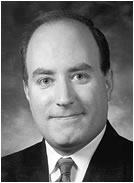Liveblogging the CivPro reading. Brought to you by the Federal Rules of Civil Procedure, Rule 8(e)(2) and Rule 11.
5:40 pm.
Case at hand: McCormick v. Kopmann
Illinous Court of Appeals, Third District. 1959
5:41. First head-scratcher. The defendant spells his name Lorence [
sic] (utilized, and incorrectly, just for you, Armen) Kopmann. Odd spelling. I suppose it's the old law professor maxim at work: odd spellings beget odd parties beget odd cases beget odd decisions begets good casebook entries.
5:46. Damn that first entry took a long time to correctly compose. Better get a move on or I'll be on blogger all night.
5:47. Back to the facts. McCormick was killed while driving down Main Street in Podunk (names have been changed to protect the innocent), Illinois. The car that collided with McCormick's was driven by Kopmann.
5:48. Awesome case already. It includes an administatrix, which just sounds dirty, let's face it. Anyways, McCormick's estate pleads (among other things) two counts in the alternative. In the first count, the estate alleges that Kopmann strayed over the center line and struck McCormick, who was exercising due care, head on. In the fourth count (counts 2 & 3 aren't at issue), the estate tries to sue a third party, the Huls, claiming that McCormick was actually driving drunk because the Huls plied him with too much booze. So, according either Kopmann was negligent, or, in the alternative, McCormick was drunk because the Huls were negligent. It's win-win for McCormick's peeps. Isn't the law grand?
5:56. Motions filed by various Ds. Denied. I can't be bothered to recount the details. Except the clever turns of phrase, like Kopmann's lawyer's characterization of allegations of Count I and IV as "fatally repugnant". Not merely repugnant.
Fatally repugnant.
6:00. Conflicting testimony. McCormick intorduces "proof" that he was in his lane the whole time. Kopmann introduces testimony to the contrary. He said, she said... Blah, blah, blah... Best conflicting testimony: Plaintiff's witness says McCormick had "one or two" bottles of beer" at Mary Huls' tavern. Mary Huls herself says McCormick had one bottle. "Several witnesses testified that McCormick had no alcholic beverages in John and Mary Huls' tavern." First observation: Yeah, like a couple of guys in a bar are going to be keeping track of how much others are drinking. Second observation: How could Huls' lawyers think these witnesses were helpful, contradicting an already inconsistent factual record?
6:03. Trial Ct. Verdict. Sorry Mr. Kopmann. Even if McCormick was boozing, you crossed the center line. Please pay $15,500. Huls get off scot-free.
6:04. Predictably, Kopmann appealed. Damn. If he didn't, it would have been, like, the greatest CivPro reading day ever! A wacky and entertaining set of facts, and little actual procedure to discuss.
6:05. Lots of law. Boring. Court's first conclusion: counts 1 and 4 are mutually exclusive, McCormick can't recover damages on both counts. But he can still plead both. Sorry Kopmann. Things aren't looking good for you so far.
6:07. Ahh. The Rule. How satisfying: order amidst the chaos. Apparently, Illinois law, based on FRCP Rule 8(e)(2), "expressly permits a plaintiff to plead inconsistent counts in the alternative, where he is genuinely in doubt as to what the facts are and what the evidence will show." More on the latter part of the preceding sentence later, I imagine. Policy justification for pleading in the alternative: settle controversies most justly in a single action, as opposed to several individual actions.
6:17. Phone call!
6:30. Ahh, the unassailable logic of the judiciary. According to the court, McCormack's best move in the case was dying. If he had lived, he could not have plead both counts(because he would not likely have been "genuinely in doubt" as to the facts). But he died. So his estate can float however many cockamanie versions they want. Just win, baby. Just win.
6:45. Losing steam. Can't be bothered to blog further. Court thinks that plaintiffs should be allowed to plead in the alternative, otherwise their whole case may be dismissed and justice would be denied. Never mind the fact that in this particular case, the plaintiff plead two wholly contradictory alternatives, thereby boosting the odds that it would win no matter how the jury understood the facts. Moreover, the plaintiff never actually tried to prove all of the elements for Count IV against the tavernkeepers. So this claim seems a bit frivolous, or at best a psychological ploy meant to maximize a jury's opportunity to compensate the plaintiff. You can see McCormick's lawyer up there now: "Ladies and Gentlemen of the jury! Mr. McCormick was killed in an accident. Someone is at fault, and that someone should pay a price -- the cost of raising McCormick's children, for example -- for the wrong that has been done! Now, if you think Mr. Kopmann did it, find for us on Count I. But if you buy the notion that Mr. McCormick may have had too much to drink, then find for us on Count IV. Thank you and God bless."
6:55. In the notes, we learn that at common law, plaintiffs could not plead inconsistent allegations. This apparently "put the plaintiff in a very difficult situation," as she could only plead one of two or more equally plausible claims, leaving the defendant an easy defense: another equally plausible claim. Wah. Wah. Wah. I like the common law rule. I know -- in fact, our whole torts class now knows -- the Emersonian lament that "foolish consistency is the hobgoblin of simple minds." But I happen to feel that a plaintiff should have to be reasonably sure that the person he drags into court has actually wronged him. If he's not sure, he'll should just have to do more pre-trial investigation.
Oh well, this has been an interesting exercise. Not as fun, or funny, as I'd hoped. Thanks for reading, if you've read this far, and don't worry: I won't try this again.
Labels: Law School






